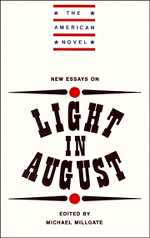Book contents
- Frontmatter
- Contents
- Series Editor's Preface
- 1 Introduction
- 2 “A Novel: Not an Anecdote”: Faulkner's Light in August
- 3 Plots and Counterplots: The Structure of Light in August
- 4 Light in August: The Closed Society and Its Subjects
- 5 The Women of Light in August
- 6 On the Difference between Prevailing and Enduring
- Notes on Contributors
- Selected Bibliography
4 - Light in August: The Closed Society and Its Subjects
Published online by Cambridge University Press: 23 November 2009
- Frontmatter
- Contents
- Series Editor's Preface
- 1 Introduction
- 2 “A Novel: Not an Anecdote”: Faulkner's Light in August
- 3 Plots and Counterplots: The Structure of Light in August
- 4 Light in August: The Closed Society and Its Subjects
- 5 The Women of Light in August
- 6 On the Difference between Prevailing and Enduring
- Notes on Contributors
- Selected Bibliography
Summary
Until the subject of a tyrant's will
Became, worse fate, the abject of his own
– Percy Bysshc Shelley, Prometheus UnboundAS has often been pointed out, none of the main characters of Light in August belongs to the community of Jefferson. They are all outsiders, if not outcasts, living in isolation, and in sharp contrast to most of Faulkner's earlier and later books, the family here fails to serve its purpose as mediating agency between individual and society.
“The Community and the Pariah” the title of Cleanth Brooks's classic study of the novel, aptly summarizes its central theme. And Brooks is equally right to call attention to the specific nature of the social environment in which the destinies of its characters are acted out: a traditional rural society, such as could still be found in the Deep South of the twenties and thirties - a society or, to use Brooks's term, a “community,” a tightly knit social organization with something like an “organic” character, whose stability is guaranteed by unanimous acceptance of inherited values and unquestioning compliance with established cultural codes. Brooks, however, is not content with underscoring the community's pull and power; he celebrates it as a “positive norm,” the ideal standard by which all individual actions ought to be judged. The causes of Joe Christmas's or Joanna Burden's sufferings are then not far to seek: if both lead miserable lives and die violent deaths, it is essentially because, in departing from the social roles prescribed for them, they have forfeited their right to membership in the community.
- Type
- Chapter
- Information
- New Essays on Light in August , pp. 81 - 102Publisher: Cambridge University PressPrint publication year: 1987
- 2
- Cited by



